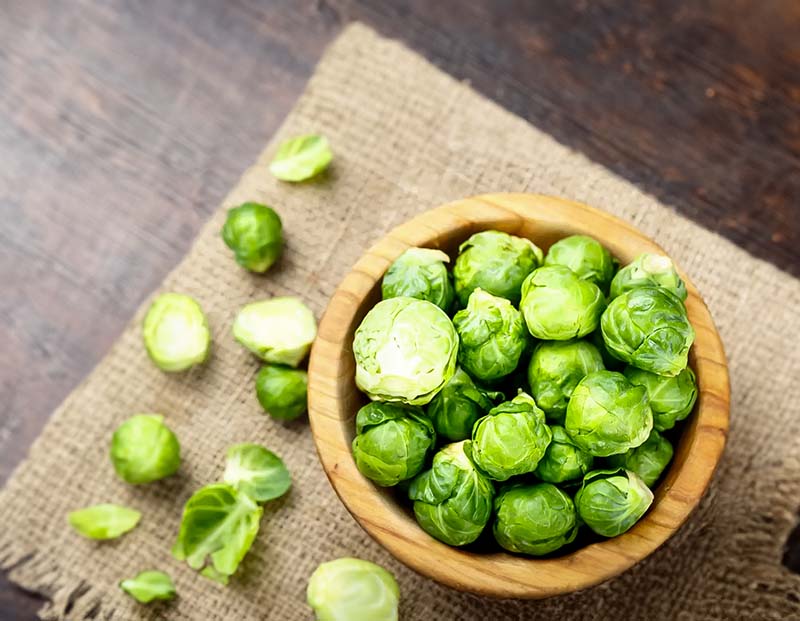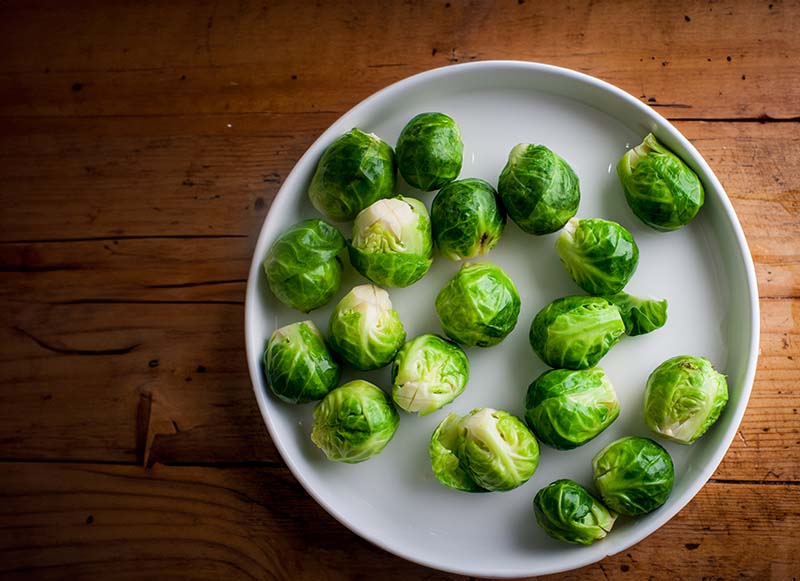Amid the ever-changing landscape of nutritional advice and diet trends, a pertinent question arises: “Are Brussels sprouts good for weight loss?” Our blog takes a thorough look at the significant role Brussels sprouts can play in successful weight management.
Join us as we investigate the impressive benefits of incorporating these nutrient-rich green vegetables into your diet. Discover how Brussels sprouts, frequently overlooked in their potential, could be a critical element in your path to a healthier lifestyle.
Related articles
- Is Asparagus Good for Weight Loss? Benefits and Side Effects.
- Does Kale Help You Lose Weight? Uncover the Truth.
- Does Oatmeal Help with Weight Loss? Nutritional Information.
Are Brussels Sprouts Good for Weight Loss?
Brussels sprouts support weight loss quite well. These little “green gems” are not only low in calories but also high in fiber. This is great news for those looking to shed a few pounds, as fiber is known to foster a sense of fullness. This means you’re likely to consume fewer calories overall, steering you towards potential weight loss.

The magic of Brussels sprouts doesn’t stop there. Their high fiber content plays a crucial role in slowing down digestion. This slower process means your body takes its time to absorb nutrients, and you experience longer-lasting satiety. This is accompanied by signals to your appetite, subtly suggesting that you don’t need to eat more, thus helping you to manage your portions better.
But Brussels sprouts aren’t just about weight control. They’re a treasure trove of nutrients and antioxidants. This makes them not just a smart choice for those looking to slim down, but for anyone interested in a healthy diet. Rich in vitamins and minerals, these sprouts contribute to overall well-being, making them an excellent addition to your meal plans.
Nutritional Information of Brussels Sprouts
Understanding the nutritional profile of Brussels sprouts is essential to appreciate their role in a healthy diet. Here’s a breakdown of the key nutrients and their benefits:
Calories: A one-cup serving of boiled Brussels sprouts (156g) contains a mere 56 calories. This low-calorie content makes them an excellent choice for those looking to manage their weight effectively.
Carbohydrates: Brussels sprouts provide 11 grams of carbohydrates per cup, with over 4 grams of it coming from dietary fiber. Fiber is crucial for promoting a sense of fullness, aiding in digestion, and stabilizing blood sugar levels. Brussels sprouts have a low glycemic index, making them suitable for individuals on low-carb diets or those concerned about blood sugar management.
Fats: Brussels sprouts are very low in fat, containing only 0.8 grams per cup. The majority of this fat is unsaturated, which is heart-healthy and supports overall well-being.
Protein: Each cup of Brussels sprouts offers approximately 4 grams of protein. While they can be a decent source of plant-based protein when consumed in larger quantities, it’s essential to remember that Brussels sprouts are not a complete protein source. To meet your protein needs, include a variety of protein-rich foods in your diet.
Vitamins and Minerals: Brussels sprouts are rich in several essential vitamins and minerals:
- Vitamin K: A single cup of Brussels sprouts provides a remarkable 219 micrograms of vitamin K. This vitamin is vital for heart health, blood clotting, and overall longevity.
- Vitamin C: Brussels sprouts are an excellent source of vitamin C, offering 97 milligrams per cup. Vitamin C is essential for a robust immune system and overall health.
- Folate: With 93.6 micrograms per cup, Brussels sprouts contribute to your daily folate intake. Folate is important for cellular energy production and overall well-being.
- Vitamin A: Brussels sprouts contain 24% of the daily recommended amount of vitamin A. This vitamin supports eye health and strengthens the immune system.
- Manganese: These little green vegetables also provide manganese, a mineral that plays a role in metabolizing carbohydrates, amino acids, and cholesterol.
Weight Loss Benefits of Brussels Sprouts
Brussels sprouts are a nutritional powerhouse, offering a multitude of benefits for those looking to manage their weight and improve overall health. Packed with a variety of minerals, fibers, vitamins, and antioxidants, they are an excellent addition to any balanced diet.
One of the key benefits of Brussels sprouts is their high dietary fiber content. Fiber plays a crucial role in weight management by slowing down the digestion process. This leads to prolonged feelings of fullness and satisfaction, helping you avoid overeating. The appetite-suppressing signals that fiber sends to your body are instrumental in maintaining portion control.
Apart from aiding in weight management, Brussels sprouts are low in calories yet rich in essential nutrients. They are particularly abundant in fiber, vitamin K, and vitamin C. Vitamin K is crucial for bone health and blood clotting, while vitamin C is a strong antioxidant that supports the immune system and skin health. .

The fiber in Brussels sprouts also has a positive impact on blood sugar regulation. By helping to stabilize blood sugar levels, they can prevent the spikes and crashes that often lead to cravings and overeating. Additionally, the fiber contributes significantly to digestive health, promoting a healthy gut. This is crucial not just for overall well-being but also for efficient metabolism and weight control.
Furthermore, the high fiber content in Brussels sprouts supports regular bowel movements, ensuring good gut health. Regularity is important for detoxifying the body and maintaining a healthy digestive system.
In summary, incorporating Brussels sprouts into your diet offers multiple benefits. They not only help in promoting satiety and regulating blood sugar but also play a significant role in supporting digestive health. Their nutrient-rich profile makes them an ideal food for those seeking a healthy, balanced approach to weight management.
Health Benefits of Brussels Sprouts
Brussels sprouts are truly a nutritional powerhouse, providing countless health benefits that can positively impact many different aspects of your health. In addition to helping you lose weight, Brussels sprouts also have a number of other benefits such as:
Enhance Digestive System Health
Brussels sprouts are a fantastic source of soluble fiber, which absorbs water in your digestive system, aiding in regular bowel movements.
Moreover, the fiber in Brussels sprouts nourishes beneficial gut bacteria, contributing to a balanced gut microbiome—an essential element for healthy digestion.

Reduces the Risk of Digestive Disorders
Regular consumption of fibrous foods like Brussels sprouts is associated with a decreased risk of gastrointestinal cancers, as supported by scientific research in the journal Pharmaceutics.
Aids in Supporting the Immune System
While vitamin C is often associated with citrus fruits, Brussels sprouts also pack a punch with their high vitamin C content. A single cup of raw Brussels sprouts provides your entire daily recommended dose of vitamin C for women, bolstering your immune system. .

Support Cardiovascular Health
Adequate fiber intake, such as that found in Brussels sprouts, has been linked to improved blood lipid profiles, including cholesterol. This reduction in blood lipids may lower the risk of heart disease. Additionally, fiber intake can improve blood sugar control, further reducing heart disease risk.
Increase Eye Health
Brussels sprouts contribute to eye health by providing vitamin A, which promotes healthy vision and cell growth. Additionally, they contain lutein and zeaxanthin, essential nutrients for maintaining good eyesight.

Fights Some Cancers
Compounds in cruciferous vegetables like Brussels sprouts have shown promise in preventing cancer by enhancing antioxidant defenses, DNA protection, and healthy cell signaling, according to the American Institute for Cancer Research.
Reduces the Risk Of Birth Defects
Brussels sprouts are rich in folate, a crucial nutrient for preventing birth defects, particularly in the brain and spine. Folate is essential for everyone, not just pregnant individuals, as it plays a vital role in the formation and function of red blood cells.
Promotes cognitive well-being
The glucosinolates in Brussels sprouts, a natural compound, have been associated with brain health. They help protect against inflammation, which can lead to chronic diseases and tumor growth. This makes Brussels sprouts, along with other cruciferous vegetables, a brain-boosting choice.
Supports healthy weight loss
Brussels sprouts are nutrient-dense and low in calories, making them an excellent addition to a weight loss-oriented diet. Their high fiber content promotes satiety, helping you feel full without consuming excess calories.

Possible Limitations of Consuming Brussels Sprouts
Consuming raw Brussels sprouts shares similarities with eating other raw cruciferous vegetables such as cabbage or broccoli, both in terms of flavor and potential digestive effects. One notable characteristic of raw Brussels sprouts is their somewhat bitter taste, which might not appeal to everyone. Moreover, they may lead to increased gas for some individuals.
This gas production is largely due to a type of indigestible fiber known as raffinose present in Brussels sprouts. When this fiber reaches the large intestine, the bacteria residing there attempt to break it down. This process leads to the production of gases like hydrogen, carbon dioxide, and methane, which can cause discomfort in the digestive system.
For people with pre-existing digestive issues, such as irritable bowel syndrome (IBS), consuming raw Brussels sprouts might exacerbate their symptoms. Additionally, individuals who are not accustomed to regularly eating Brussels sprouts or similar vegetables might also experience more pronounced discomfort due to the sudden introduction of these fibers to their diet.
It’s important to consider these factors when incorporating raw Brussels sprouts into your diet. Gradually increasing their consumption can help your digestive system adjust. For those with sensitive stomachs or specific conditions like IBS, it may be advisable to limit the intake of raw Brussels sprouts or opt for cooked versions, which tend to be easier to digest.

How to Cook Brussels Sprouts to Lose Weight
When preparing Brussels sprouts as part of a weight loss plan, the cooking method can significantly impact both flavor and nutritional value. Here are some effective techniques:
- Roasting: This method enhances the sprouts’ natural flavors while preserving their nutritional integrity. Start by preheating your oven to 425°F (218°C). Arrange the sprouts on a parchment-lined baking sheet, lightly coated with olive oil, and seasoned with salt and pepper. Roasting for about 25 minutes until the edges turn a delicious golden brown not only brings out a delightful nuttiness but also maintains their health benefits.
- Steaming: For a nutrient-rich approach, steaming is your go-to method. This gentle cooking technique ensures the sprouts remain nutrient-dense. Just place them in a steamer basket over boiling water, steaming for 5-7 minutes until they reach a perfect tender texture.
- Sautéing: A quick sauté in olive oil is both healthy and flavorful. Start with a warm skillet, add the halved Brussels sprouts, some minced garlic, and a hint of red pepper flakes for a kick. Sauté them for 5-7 minutes until they’re tender yet retain a satisfying crunch. Enhance the dish with a burst of freshness by adding a squeeze of lemon juice and a sprinkle of lemon zest right before serving.
- Stir-frying: Combine Brussels sprouts with other veggies in a stir-fry for a diverse and nutritious dish. Cook them for 5-7 minutes until tender-crisp. To elevate the taste, add a dash of low-sodium soy sauce and a sprinkle of sesame seeds for a subtle, nutty flavor.
Conclusion
In conclusion, are Brussels sprouts good for weight loss? The simple answer is yes. Brussels sprouts can be a valuable addition to your weight loss journey, providing many health benefits including fiber, vitamins and antioxidants. Whether you’re trying to lose weight or simply looking for a nutritional supplement to your diet, these little “green gems” have proven their worth.
We’d love to hear your Brussels sprout success stories! Have you lost weight or improved your health by incorporating them into your meals? Please share your journey with us in the comments section below. And remember, for more insightful blogs on health, nutrition and wellness, don’t forget to explore other informative articles from Blonde Beauty. Your path to a healthier life starts here!

Laureate Professor Clare Collins
Professor Clare Collins is a leading expert in nutrition and dietetics at the School of Health Sciences, part of the College of Health, Medicine and Wellbeing. Her work is changing the way we think about food and health. She grew up as one of nine children and was the first in her family to finish high school and go to college. This background gave her a strong work ethic and a deep appreciation for seizing opportunities.
As the Director of the Hunter Medical Research Institute’s Food and Nutrition Program and a recipient of three NHMRC Research Fellowships, Professor Collins is making a big difference in public health. She focuses on helping people who are often overlooked, using new technologies like apps and online programs to improve their nutrition and reduce the risk of chronic diseases.
Professor Collins is well-respected and has been recognized as a Fellow in four major health and science organizations. She leads a diverse team of experts, including dietitians, computer scientists, and engineers, working together on global health projects.
Her achievements are impressive. She has received over $29 million in research funding, published more than 450 papers, and helped 35 PhD and Master’s students complete their degrees. She’s also active in sharing her knowledge with the public. She has developed tools like the Australian Eating Survey and the Healthy Eating Quiz, and she often appears in the media to talk about nutrition.
PUBLISHED ARTICLES
- Collins, C. (2019). “The Effect of a Pilot Dietary Intervention on Pain Outcomes in Patients Attending a Tertiary Pain Service.”
- Collins, C. (2022). “Variation in cardiovascular disease risk factors among older adults.”
- Collins, C. (2022). “Evaluation of an online intervention for improving stroke survivors’ health-related quality of life: A randomised controlled trial.”
These articles show Professor Collins’s commitment to understanding how better nutrition can improve health. Her work is important for researchers, doctors, and anyone interested in healthy living.
